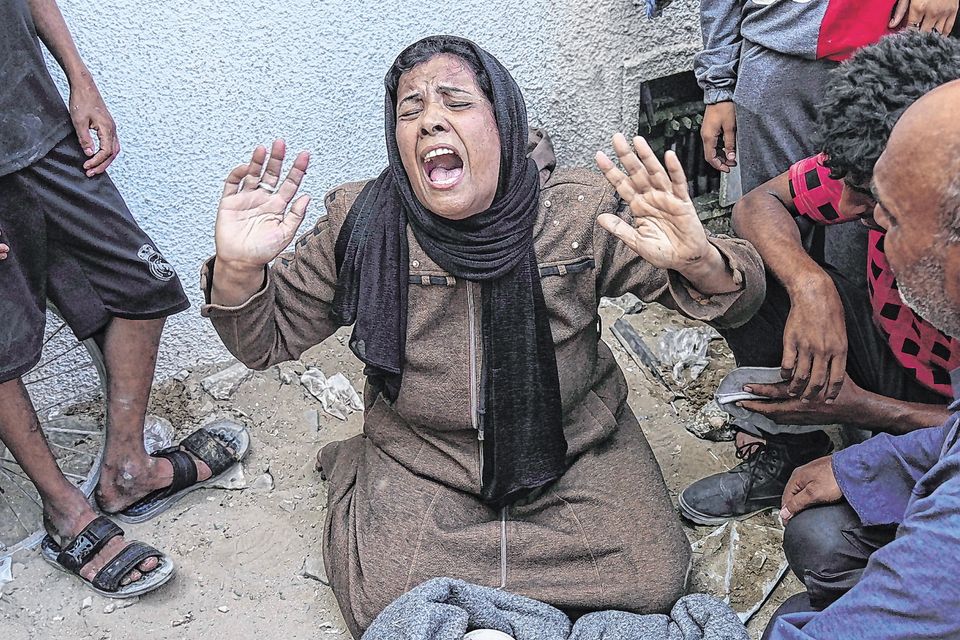World
Israeli Airstrikes Claim 31 Lives Amid Fuel Crisis in Gaza

Israeli airstrikes across the Gaza Strip have resulted in the deaths of at least 31 people overnight, according to local hospitals. The attacks come as the region faces a critical shortage of fuel, putting hospitals and essential infrastructure at significant risk, as warned by various United Nations agencies.
The recent escalation in violence follows two days of talks between U.S. President Donald Trump and Israeli Prime Minister Benjamin Netanyahu that concluded with no resolution regarding a ceasefire or the release of hostages. The discussions, which took place last week, were intended to address the ongoing conflict but ended without any significant breakthroughs.
The United Nations has expressed grave concerns regarding the humanitarian situation in Gaza, highlighting that fuel shortages have severely impacted hospitals’ ability to operate. Medical facilities are struggling to provide care amid the relentless airstrikes, which have intensified in recent days. Local health authorities report that the combination of violence and lack of resources is exacerbating an already dire health crisis in the region.
In response to the airstrikes, the Israeli Defense Forces (IDF) stated that their military operations are aimed at targeting Hamas infrastructure. The conflict has seen a significant increase in casualties and destruction, further complicating the humanitarian situation. With the death toll in Gaza rising, the international community is calling for urgent measures to address the humanitarian needs of civilians.
The Israeli government has attributed some of the collateral damage to “technical errors.” This statement follows incidents where Israeli strikes reportedly hit civilians, including children. Reports indicate that at least six children were killed in a separate incident involving a drone strike that the IDF attributed to a malfunction.
As the situation continues to unfold, the need for international intervention and dialogue has become increasingly urgent. Human rights organizations and various nations have called for a ceasefire and for both sides to engage in meaningful negotiations to prevent further loss of life and to ensure humanitarian aid reaches those in need.
The ongoing conflict highlights the complexities surrounding the Israel-Palestine issue, a longstanding geopolitical struggle that has seen numerous attempts at resolution over the years. The recent escalation has drawn international concern not only for the immediate impacts on civilian life but also for the broader implications for stability in the region.
Local hospitals are now operating under extreme conditions, facing shortages of essential medical supplies and staff. Doctors and nurses are working tirelessly to treat the wounded, but the ongoing violence and resource scarcity hamper their efforts. The UN has called for an immediate ceasefire to allow humanitarian assistance to flow into Gaza and for both parties to adhere to their obligations under international law.
As the world watches, the situation in Gaza remains critical. The combination of military aggression and humanitarian crisis demands urgent attention from global leaders to foster a path toward peace and stability in this troubled region.
-

 Top Stories5 months ago
Top Stories5 months agoTributes Surge for 9-Year-Old Leon Briody After Cancer Battle
-

 Entertainment6 months ago
Entertainment6 months agoAimee Osbourne Joins Family for Emotional Tribute to Ozzy
-

 Politics6 months ago
Politics6 months agoDanny Healy-Rae Considers Complaint After Altercation with Garda
-

 Top Stories6 months ago
Top Stories6 months agoIreland Enjoys Summer Heat as Hurricane Erin Approaches Atlantic
-

 World7 months ago
World7 months agoHawaii Commemorates 80 Years Since Hiroshima Bombing with Ceremony
-

 Top Stories5 months ago
Top Stories5 months agoNewcastle West Woman Patricia Foley Found Safe After Urgent Search
-

 Top Stories7 months ago
Top Stories7 months agoFianna Fáil TDs Urgently Consider Maire Geoghegan-Quinn for Presidency
-

 World7 months ago
World7 months agoCouple Convicted of Murdering Two-Year-Old Grandson in Wales
-

 World7 months ago
World7 months agoGaza Aid Distribution Tragedy: 20 Killed Amid Ongoing Violence
-

 Top Stories6 months ago
Top Stories6 months agoClimbing Errigal: A Must-Do Summer Adventure in Donegal
-

 Top Stories6 months ago
Top Stories6 months agoHike Donegal’s Errigal Mountain NOW for Unforgettable Summer Views
-

 World7 months ago
World7 months agoAristocrat Constance Marten and Partner Convicted of Infant Murder









